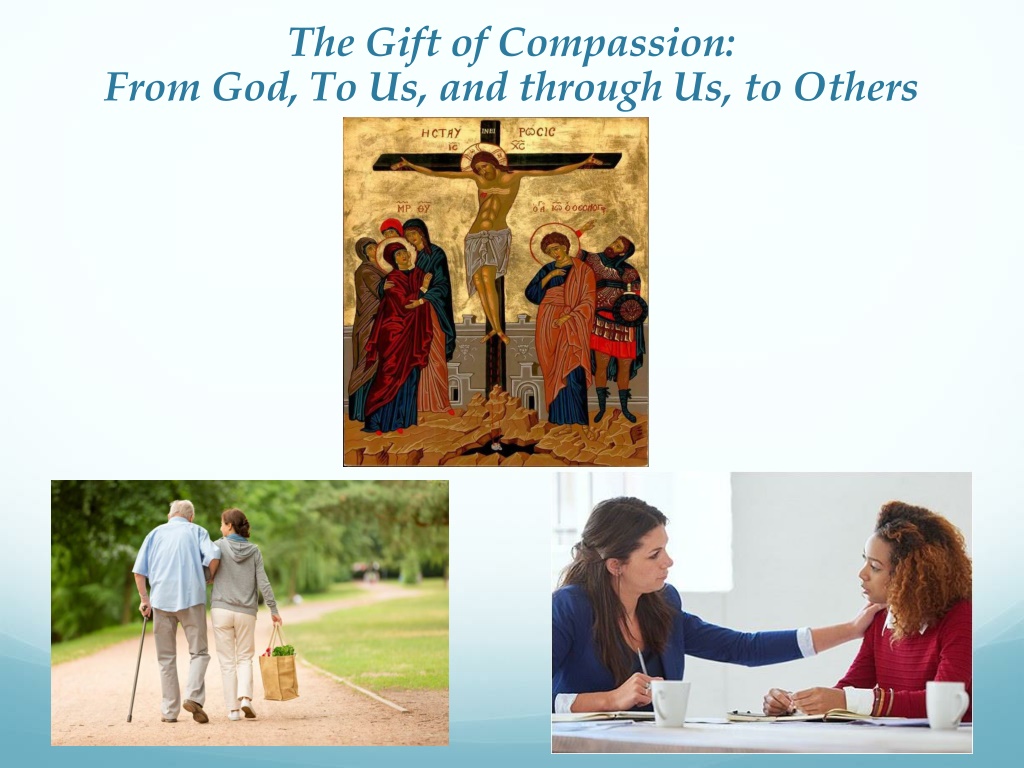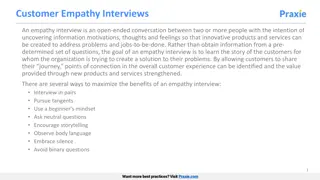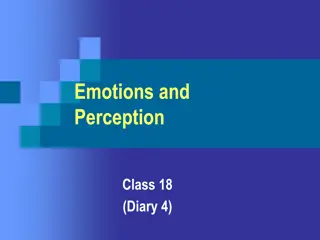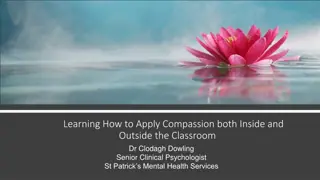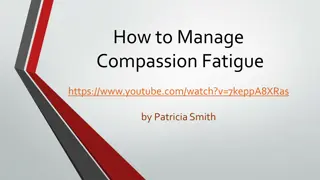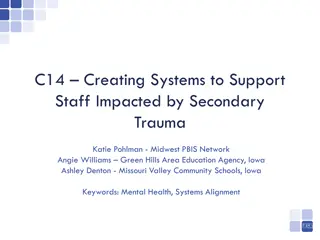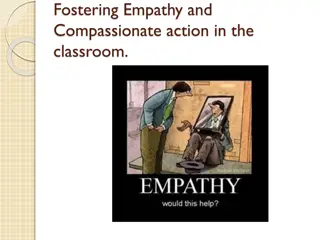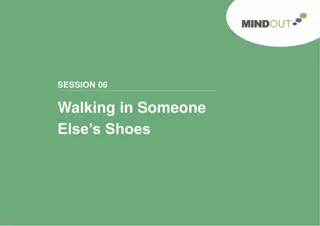The Essence of Compassion: Understanding and Cultivating Empathy
Delve into the profound meaning of compassion as a God-given gift that flows from empathy and manifests through acts of mercy and love. Explore the deep roots of compassion in various contexts, from the Old Testament to modern-day research, revealing its innate nature and transformative power in relationships.
Download Presentation

Please find below an Image/Link to download the presentation.
The content on the website is provided AS IS for your information and personal use only. It may not be sold, licensed, or shared on other websites without obtaining consent from the author. Download presentation by click this link. If you encounter any issues during the download, it is possible that the publisher has removed the file from their server.
E N D
Presentation Transcript
The Gift of Compassion: From God, To Us, and through Us, to Others
Working Definitions Sympathy: understanding and positive regard and concern for one in need; feeling sorrow, pity for another (sym=with, pathos=suffering) Mercy: compassion, pity or forbearance shown especially to an offender or to one subject to one's power (eleos) COMPASSION: a sympathetic consciousness of the distress of the other/love and concern for the other coupled with action; literally, suffering with another (com=with, passion=pathos, suffering) Empathy: to feel with the other; to experience the feelings, thoughts of the other; to put yourself in the shoes of the other (en=in, path=suffering)
High level of empathy characterized by Continual focus on other people s feelings Regular state of hyperarousal other people never off the radar, constantly compelled to think of others Excessive concern with others and placing needs of others before appropriate/holy care of self Inner disposition determined by others situations ( If everyone else is happy, I m happy. ) Asymmetrical relationships give and do not receive (Adapted from work of Baron-Cohen and Helgeson & Fritz)
Research shows that Compassion is learned has biological and neurological components is innate; humans have a natural compulsion to help those who are suffering. In men compassion is primarily manifested through protection; in women through nurture.
Compassion in Old Testament Hebrew: Racham Deep seated emotional feelings that drive us to aid/ comfort those in distress; feeling that lies behind acts of mercy One of the many words used for love in the Hebrew OT Related to maternal instincts of a mother for her child from the womb
Compassion in the OT usually refers to --God s pardon, forgiveness, and restoration of His people, the Israelites, after they have fallen/turned away from Him But the Lord was gracious to them and had compassion on them; he turned toward them, because of his covenant with Abraham, Isaac, and Jacob, and would not destroy them. . . (2 Kings 13:23) --or maternal instincts, a mother s compassion for her child. . . Can a women forget her nursing child, and have no compassion on the son of her womb? Even these may forget, but I will not forget you. (Isa. 49:15)
NT Greek: Splahna/Splahnizome The heart; the center of feelings; the seat of emotions The womb; the loins; the bowels Inner disposition that leads to acts of mercy To be moved to compassion, as to one s bowels Bowels believed to be the seat of love and pity in the body
Feeding of the 4000 (Matthew 15:29-39) Many are gathered on a mountainside near the Sea of Galilee and Jesus heals them of diseases and infirmities... Jesus tells the disciples: I have compassion for the crowd, because they have been with me now for three days and have nothing to eat; and I do not want to send them away hungry, for they might faint on the way.
Parable of the Good Samaritan (Luke 10:25-37) But a certain Samaritan, who was on a journey, came upon him; and when he saw him, he felt compassion. He went to him and bandaged his wounds. . . (10:33)
Parable of the Prodigal Son (Luke 15:11-32) And he got up and came to his father. But while he was still a long way off, his father saw him, and felt compassion for him, and ran and embraced him, and kissed him.
The Widows Son at Nain (Lk. 7:11-17) . . . when the Lord saw her [the widow], he had compassion on her and said, Do not weep. And he came and touched the bier . And he said, Young man, I say to you, arise. And the dead man sat up and began to speak. And he gave him to his mother.
Henri Nouwen on The Widows Son at Nain: Compassion means to suffer with, to live with those who suffer. When Jesus saw the woman of Nain he realized, this is a widow who has lost her only son, and he was moved by compassion. He felt . . . pain . . . in his guts. He felt . . . pain so deeply in his spirit that out of compassion he called the son to life so he could give that son back to his mother.
The Incomparable Compassion of Christ on the Cross (Saint Augustine)
God in His infinite love is the Source of all compassion, which grows in us as we live and breathe the life in Christ. We are the vessels through whom God s compassion flows to others.
Compassionate Responses in Dialogue: Convey the message that you have time for the person; make eye contact, sit at eye level, touch appropriately Allow the person to tell her story Provide a safe, non-judgmental, sacred space Ask a few open-ended questions if needed Set appropriate boundaries Know your limitations Listen to hear and understand/active listening Pray silently Know that silence is ok
Uncompassionate Responses in Dialogue Use platitudes, such as: 1. God never gives us more than we can handle; 2. Everything happens for a reason; 3. I understand what you are going through; 4. I know how you feel; 5. It could be worse; 6. everything will be ok . . . Make it about yourself Try to fix the situation/carry the bag for the person Fish for information/detail Give unsolicited advice Put yourself over the other person
A Model for the Listening Face of Compassion When we talk to our fellow men and they tell us about their troubles, we will listen to them carefully if we have love for them. We will have compassion for their suffering and pain, for we are God's creatures; we are a manifestation of the love of God. (Elder Thaddeus of Vitovnica)
Humanity and Compassion Made in the image of God the Holy Trinity, in the image of love, it is only through compassion through our ability to suffer with and for others in loving and generous companionship that we become truly human. (Metropolitan Kallistos Ware, Divine Compassion Conference hosted by St. Catherine s Vision, 2015)
Faces of Compassion Touch Celebration Meeting an immediate, present need Listening and hearing Providing for a distant need Anticipating needs and acting on them Laying down our life for the other Silence Words of comfort Presence
Growing in Compassion Dependence on Christ as The Source Appropriate healthy/holy self-care The ability to feel for the pain of the other while maintaining one s own integrity of personhood Concern for others not obsessive Outward circumstances do not dictate inner well-being The ability to both give and receive
Finally, let us remember the Mother of The Compassionate One, and the Mother of us all, and pray together: To the Theotokos let us run now most earnestly, we sinners all and wretched ones, and fall down in repentance from the depths of our souls: O Lady, come unto our aid, have compassion upon us; hasten thou for we are lost in a throng of transgressions. Turn not your servants away from empty hands, for you alone do we have as our only hope. (Hymn from Service of Paraklesis)
